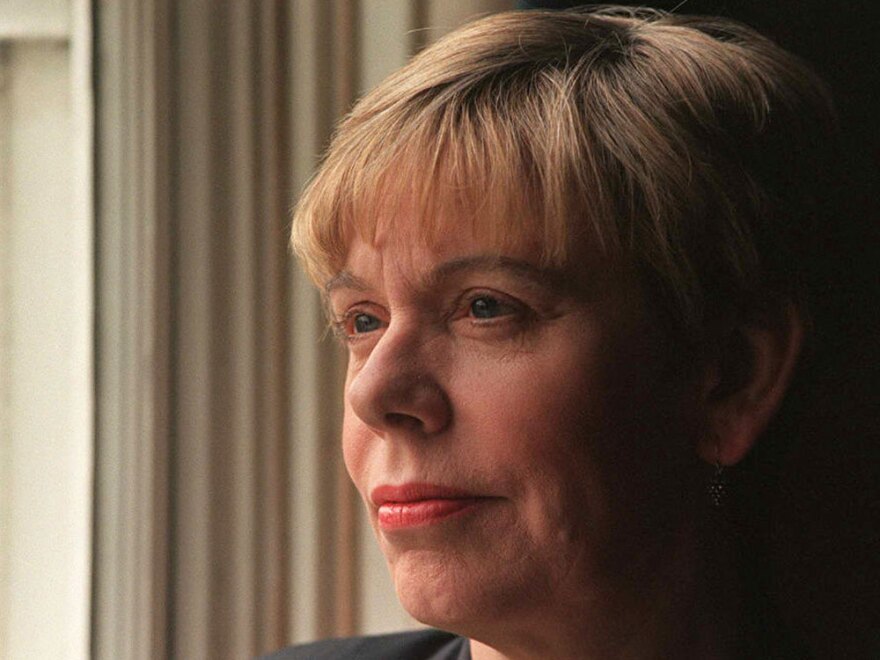
Science and religion have an uneasy relationship. Margaret Atwood, known for her literary science fiction, thinks the future holds in store a religion that combines the two. She takes her lessons from a past charted by contemporary religious scholar Karen Armstrong.
Armstrong is a religious scholar who has studied the history of belief. In her latest book, The Case for God, she looks at the relationship between science and religion. The current conflict between the two, with Darwin's theory of evolution as a flash point, is not in keeping with historical interpretations of scripture.
"Darwin came along and found a natural explanation for life itself," Armstrong says. But she notes that at an earlier point, this wouldn't have caused conflict. "Saint Augustine had ... laid down an important principle ... that if a scriptural text contradicts science, you must give it an allegorical interpretation."
While Armstrong's work looks at the lessons of the past, Atwood extrapolates from the past to create visions of the future. One of Atwood's best known novels is The Handmaid's Tale, which imagines a future in which America has become a Christian fundamentalist theocracy.
Atwood says science fiction became necessary when the contradictions between objective reality and religious orthodoxy became too difficult to ignore.
"Those things that we used to just believe in all the time went to Planet X where they are alive and well," Atwood says by way of explaining the alternate realities that populate the genre. "Angels with flaming swords, the burning bush that speaks, you know, all of those really quite science fiction things in the Bible."

Looking For Meaning
Armstrong says her research into the history of religion demonstrates that science and religion are two very different kinds of knowledge.
"Religion is not answering our scientific questions about, 'How did the world come into being?' " Armstrong says. "That's a question for science. Religion is asking us to consider these problems that always occur to human beings: 'Why is life so filled with pain? What is the nature of happiness? What is the meaning of our mortality?' "
Armstrong sees the role of religion as a guiding force for ethical behavior. Atwood brings that notion to life in her newest novel, The Year of the Flood. It's set in a dystopian near future where genetic engineering has ravaged much of the planet and survivors have created a new religion based on preservation.
"This group, which is called God's Gardeners, has taken it to an extreme that not everybody will be able to do," Atwood explains. "They live on rooftops in slums in which they have vegetable gardens. They keep bees. And they are strictly vegetarian, unless you get really, really hungry. In which case you have to start at the bottom of the food chain and work up. And they make everything out of recycled castoffs and junk."

Rooted In Reality
Atwood points out that the beginnings of her religion of the future have already appeared in the present.
"Indeed, we now have the Green Bible among us, which I did not know when I was writing this book," Atwood marvels. "[It] has tasteful linen covers, ecologically correct paper ... and a list at the end of useful things which you can do to be a more worthy 'green' person."
For her novel, Atwood created a new pantheon of saints, including Rachel Carson, Al Gore and the murdered conservationist Dian Fossey. Fossey figures into one of the hymns Atwood wrote for God's Gardeners:
Atwood's environmentally based religion dovetails with an idea at the core of Armstrong's understanding of faith.
"The creation story was therapeutic," Armstrong says. "It was telling us how to be creative ourselves and, indeed, how to keep the cosmos in balance. Men and women and gods had to work together to keep this fragile ecostructure together."
Armstrong's philosophical ecosystem is reflected in Atwood's futuristic religion. But even though God's Gardeners feels like a real religion, Atwood is not ready to step up to the pulpit, despite a literary precedent.
"Well, not quite in the same way that L. Ron Hubbard did," Atwood says with a chuckle. "I don't have any adherents yet. But, who knows?"
Copyright 2023 NPR. To see more, visit https://www.npr.org.



